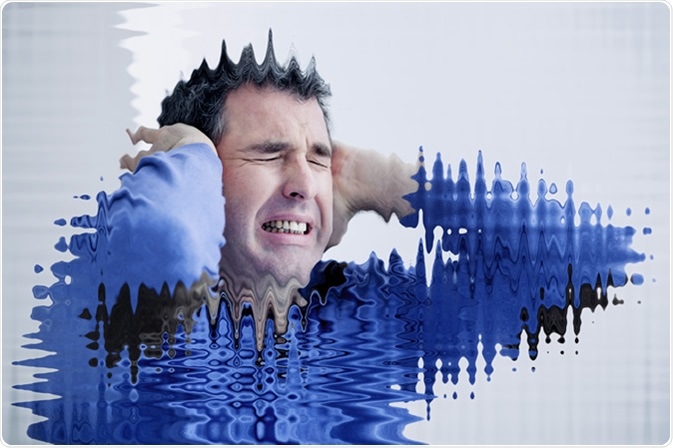Hyperacusis is the term used to describe a decreased tolerance and increased sensitivity to everyday sounds that are not usually thought of as particularly loud or uncomfortable.
Examples of the sounds that people with this condition often report as problematic include children’s screams, the sound of machinery or electrical devices and sharp, high-pitched noises such as car alarms or bus brakes.
The severity of the condition varies, with some individuals reporting mild irritation or discomfort on exposure to certain sounds and others reporting unbearable discomfort and even pain.
In some cases, the aversion to certain sounds means people avoid social and public situations, which can lead to anxiety and social isolation.

Image Credit: Image Point Fr / Shutterstock
Cause
The cause of hyperacusis is poorly understood and the precise mechanism behind how the condition develops is often unknown. Some of the possible causes are described in more detail below.
Hearing loss - Some researchers have suggested that the brain effectively “turns up the volume” as a way of compensating for loss of hearing. However, some individuals with the condition have normal hearing, suggesting that hearing loss alone does not explain the problem.
Previous ear trauma - Hyperacusis is also associated with previous ear damage. A significant number of patients with hyperacusis notice the problem develops after head injury, middle ear infection, ear, nose and throat surgery or exposure to loud noises (e.g. at work or at a nightclub).
Pre-existing hearing problems - The condition also tends to be significantly more common among people who already have a hearing problem, particularly those with a history of tinnitus.
Other theories - Some researchers have suggested that hyperacusis may arise as a result of parts of the hearing system becoming damaged. Parts involved in the “balancing” of sounds may be affected, resulting in quiet noises sounding louder and loud noises sounding quieter than they usually would. Another theory is that the sound information received by the brain is not processed in the usual way, causing hearing to become more sensitive.
Johns Hopkins University Study
Nerves in the inner ear form a network with hair cells that enables communication between the ear and the brain. Two types of hair cell are found in the inner ear: the inner hair cell and outer hair cell. Inner hair cells collect sound information and pass it on as a signal to the brain via nerve cells. Each inner hair cell is accompanied by three outer hair cells, which amplify sound when it is quiet or channel attention towards sound in the presence of a lot of background noise.
There are also two types of nerve cell in the inner ear: afferent nerves, which relay information to the brain and efferent nerves, which carry information away from the brain. Approximately 95% of afferent nerves link an inner hair cell to the brain, while efferent nerves mostly connect the outer hair cells, enabling the brain to regulate how loud or quiet sound is or to focus on certain sounds over others.
In December 2015, researchers at Johns Hopkins University School of Medicine, Baltimore, published a paper called “Unmyelinated type II afferent neurons report cochlear damage,” in Proceedings of the National Academy of Sciences. Chang Liu and colleagues were interested in the 5% of afferent nerves that do not link inner hair cells to the brain, but instead link to large numbers of outer hair cells. These particular afferent nerves do not send sound information to the brain and they are not injured by loud noise exposure, even when the outer hair cells that they are connected to are injured.
On studying these nerves, Liu and team observed that these cells closely resemble the nerve cells in skin that relay pain signals to the brain. They investigated whether the afferent nerves may be performing a similar role. The team took outer hair cells grown in inner ear cultures and damaged them. This caused them to release ATP, which triggered the afferent nerves to send more signals. The ATP closed certain protein channels in the cell membrane of the afferent nerves, which increased their excitability and their likelihood of firing. This 5% of afferent nerves could serve as pain sensors in the inner ear, signaling to the brain when exposure of the inner ear to loud noise is likely to damage the outer hair cells, so that the brain can take action to avoid this exposure.
Liu et al believe that if these afferent nerves become too sensitive, they could relay pain signals when it is not necessary, causing a person to experience discomfort in response to sound when they otherwise would not. This is similar to what is thought to happen in cases of chronic pain, when nerves involved in pain signaling become damaged and cause people to feel pain in the absence of any cause.
If this were the case, then preventing the closing of protein channels by ATP could reverse the symptoms of hyperacusis and drugs could be developed to treat the condition. Liu et al are continuing their study of these cells in the hope that this may one day be possible.
Further Reading